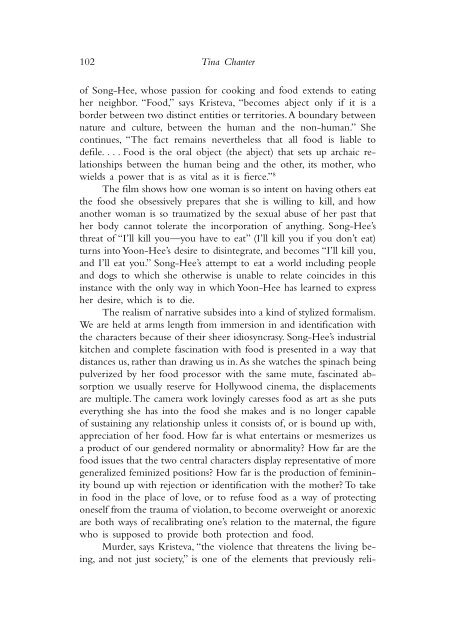Create successful ePaper yourself
Turn your PDF publications into a flip-book with our unique Google optimized e-Paper software.
102 Tina Chanter<br />
<strong>of</strong> Song-Hee, whose passion for cooking and food extends to eating<br />
her neighbor. “Food,” says Kristeva, “becomes abject only if it is a<br />
border between two distinct entities or territories. A boundary between<br />
nature and culture, between <strong>the</strong> human and <strong>the</strong> non-human.” She<br />
continues, “The fact remains never<strong>the</strong>less that all food is liable to<br />
defile. . . . Food is <strong>the</strong> oral object (<strong>the</strong> abject) that sets up archaic relationships<br />
between <strong>the</strong> human being and <strong>the</strong> o<strong>the</strong>r, its mo<strong>the</strong>r, who<br />
wields a power that is as vital as it is fierce.” 8<br />
The film shows how one woman is so intent on having o<strong>the</strong>rs eat<br />
<strong>the</strong> food she obsessively prepares that she is willing to kill, and how<br />
ano<strong>the</strong>r woman is so traumatized by <strong>the</strong> sexual abuse <strong>of</strong> her past that<br />
her body cannot tolerate <strong>the</strong> incorporation <strong>of</strong> anything. Song-Hee’s<br />
threat <strong>of</strong> “I’ll kill you—you have to eat” (I’ll kill you if you don’t eat)<br />
turns into Yoon-Hee’s desire to disintegrate, and becomes “I’ll kill you,<br />
and I’ll eat you.” Song-Hee’s attempt to eat a world including people<br />
and dogs to which she o<strong>the</strong>rwise is unable to relate coincides in this<br />
instance with <strong>the</strong> only way in which Yoon-Hee has learned to express<br />
her desire, which is to die.<br />
The realism <strong>of</strong> narrative subsides into a kind <strong>of</strong> stylized formalism.<br />
We are held at arms length from immersion in and identification with<br />
<strong>the</strong> characters because <strong>of</strong> <strong>the</strong>ir sheer idiosyncrasy. Song-Hee’s industrial<br />
kitchen and complete fascination with food is presented in a way that<br />
distances us, ra<strong>the</strong>r than drawing us in. As she watches <strong>the</strong> spinach being<br />
pulverized by her food processor with <strong>the</strong> same mute, fascinated absorption<br />
we usually reserve for Hollywood cinema, <strong>the</strong> displacements<br />
are multiple. The camera work lovingly caresses food as art as she puts<br />
everything she has into <strong>the</strong> food she makes and is no longer capable<br />
<strong>of</strong> sustaining any relationship unless it consists <strong>of</strong>, or is bound up with,<br />
appreciation <strong>of</strong> her food. How far is what entertains or mesmerizes us<br />
a product <strong>of</strong> our gendered normality or abnormality? How far are <strong>the</strong><br />
food issues that <strong>the</strong> two central characters display representative <strong>of</strong> more<br />
generalized feminized positions? How far is <strong>the</strong> production <strong>of</strong> femininity<br />
bound up with rejection or identification with <strong>the</strong> mo<strong>the</strong>r? To take<br />
in food in <strong>the</strong> place <strong>of</strong> love, or to refuse food as a way <strong>of</strong> protecting<br />
oneself from <strong>the</strong> trauma <strong>of</strong> violation, to become overweight or anorexic<br />
are both ways <strong>of</strong> recalibrating one’s relation to <strong>the</strong> maternal, <strong>the</strong> figure<br />
who is supposed to provide both protection and food.<br />
Murder, says Kristeva, “<strong>the</strong> violence that threatens <strong>the</strong> living being,<br />
and not just society,” is one <strong>of</strong> <strong>the</strong> elements that previously reli-
















